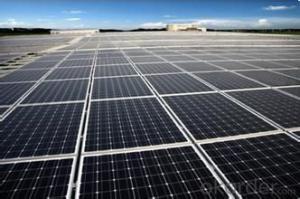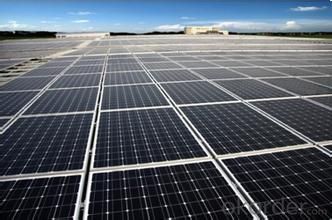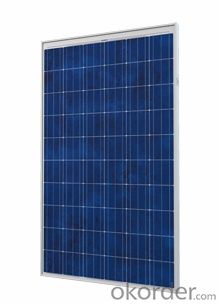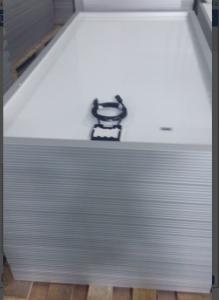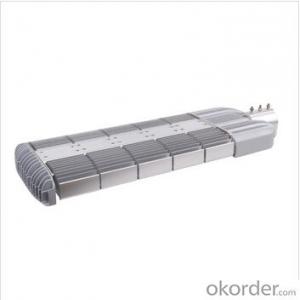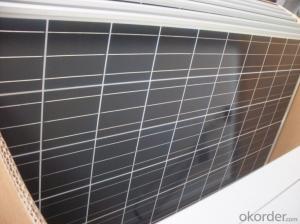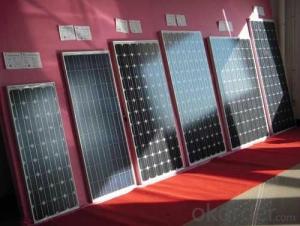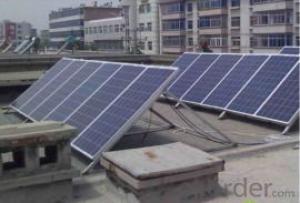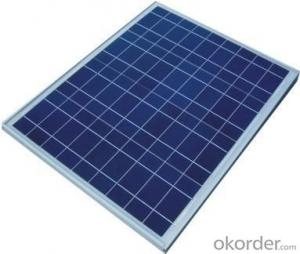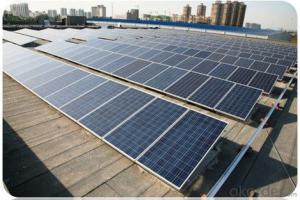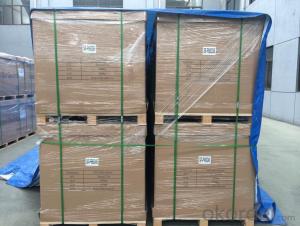250w Polycrystalline Solar Panels for Vans - West Coast Stocks
- Loading Port:
- China main port
- Payment Terms:
- TT OR LC
- Min Order Qty:
- 26 pc
- Supply Capability:
- 1000000 pc/month
OKorder Service Pledge
OKorder Financial Service
You Might Also Like
Characteristics of Solar Panel
I Solar Cell : High efficiency crystalline solar cell. Even if under the weak light, the solar module can produce maximum power output.
II Tempered glass (toughened glass): Anti-reflecting coating and high transmission rate glass increase the power output and mechanical strength of solar module.
III EVA and TPT: Using high quality EVA and TPT to prevent destroying and water
IV AI frame: Without screw, corner connection. 6 holes on the frame can be installed easily.
V Junction box: Multi function junction box with water proof.
VI Long lifetime: ≥25 years; Less power decrease.
VII Good performance of preventing from atrocious weather such as wind and hails.
VIII Resisting moisture and etching effectively, not effected by geology.
Currently,We have 250w-300w solar panel stocks in Both West and East Coasts made in Vietnam,India,Korea,Malaysia and Japan.Meanwhile,we also arrange production line in Wisconsin,USA.If you're interested,please contact us soon.
Thanks for your time.
- Q: in a solar panel, i know that the electrons are knocked loose and used as energy, what happens to the protons?
- Here okorder /... Within this structure, the electrons are not really lost from the system. An electron just gets enough energy (from light) to be able to leave its atom, and float freely around the structure. Hence you have electrons in motion, which is the definition of electric current. If the lights go out, the electrons just settle back into one of the atoms that is missing an electron.
- Q: What is the warranty period for solar panels?
- The warranty period for solar panels typically ranges from 10 to 25 years, depending on the manufacturer and the type of panel.
- Q: I'm thinking of these solar panels that people have on their rooftops in domestic properties. I suppose I mean after how long do you break even with respect to just carrying on without them and getting you electricity from the utilities companies? Or answer in any way you think is pertinent. The more info the better.
- Solar Panel Break Even
- Q: I don't have a regulator connected as they are a little expensive for a pensioner, If I join the panels into line to the battery bank from the roof should that be OK.?
- Two things on a regulator: a) It will optimize the charge to the batteries - and thereby distribute the most possible power to your active circuits during the day. b) It will prevent the power from the panels from boiling (no kidding) the batteries - no small thing as they are the second largest investment you have after the panels themselves. This is much more critical if you have sealed or Zero-Maintenance batteries. I strongly suggest that you get a regulator as it will significantly lengthen battery life. Follow the directions on the regulator for optimum input voltage and it will let you know whether all the panels should be in series, parallel or series/parallel. But cutting to the chase, you can certainly gang up panels as needed.
- Q: Are there any tax credits available for solar panel installation?
- Yes, there are tax credits available for solar panel installation. The federal government offers a solar Investment Tax Credit (ITC), which allows homeowners to deduct a portion of the cost of installing a solar energy system from their federal taxes. Additionally, some states and local governments may offer additional tax incentives or rebates for solar panel installation.
- Q: I have a college project due within a week, and it involves a 00 Watt solar panel and a 2V 7.5Ah Battery. I got the project finished up and producing free energy for my house in September, however recently the battery I bought, that was specifically made to hold Solar Power, lost its charge (unsure how or why) and it is pretty much useless. Can I just go to a store and buy any 2V car battery to use?
- well the thing to remember just like any rechargeable battery they don;t respond well to continues charging they need some down time to discharge and then recharge. during the charging process the liquid or battery solution get hot and even evaporates. Replacing the battery solution with water won't work when your battery has lost it's solution you need to get battery acid replacement or battery repair solution. this is sold in many location near where the batteries are sold. check your spec for your solar panel out put and take those specification to your local auto store and they might even suggest an over sized battery. you might consider adding an additional battery in series for additional power storage.you might also using a light sensor and cut off switch solenoid which which stop charging or which would also stop and current from returning back to the panel. if you have every own a small car the battery is much smaller than that of a pick up. be sure that you don't get the small battery look for a large heavy duty battery all sold in the same store.
- Q: Can solar panels be installed on a greenhouse?
- Yes, solar panels can be installed on a greenhouse. In fact, it is a common practice to install solar panels on greenhouses to harness the sunlight for both electricity generation and to provide supplemental lighting for the plants inside. This not only helps in reducing energy costs but also promotes sustainable and eco-friendly practices in agriculture.
- Q: I am thinking of buying a 3w solar panel called the nomad 3 from goal zero. I want to charge 35Wh lithum batteries. I have heard that lithium batteries are temperatmental and without a regulated current things could get ugly.I have a couple of chargers that came with the batteries. One is a 2v car charger and another is 0-240v wall charger.Goal zero sell something called a sherpa 50, which contains rechargeable batteries and an inverster and I think they suggest that I charge my batteries indirectly through the Sherpa 50, however, the sherpa 50 is expensive at $200, and seems to have a small capacity, in addition to being extra weight that i don`t want to carry.Electronics geniuses, you are my only hope.
- Lithium batteries do have special charging requirements. I would recommend that you use the 2 volt charger that came with them to keep them happy. Automotive power systems can have voltages as high as 4.5 volts when the engine is running so there's no need to limit the output of the panel to anything less than that. Check with the charger manufacturer to see what it will withstand. Some will work with systems up to 24 volts nominal (up to 29 volts actual) found in larger commercial vehicles such as trucks and busses. If your charger will work with both 2 and 24 volt systems you might not need anything extra to use the unregulated output of the panel. Otherwise I'd recommend a shunt regulator to clamp the output of the panel to no more than 4.5 volts. That way it would dissipate (waste) very little of the panel's power, and even that would only be during those rare times when the panel is producing maximum output. Such a device could be as simple as a high power zener diode, a low power zener coupled with a power transistor, or a precision shunt regulator such as a TL43 coupled with a power transistor. A more complex way would be a to use buck/boost regulator between the panel and your charger. You might gain a slight advantage under low light conditions when the panel isn't putting out much but the overall efficiency could end up worse than the simpler shunt regulator. Under optimum conditions, I would expect it to take a full day for a 3 watt (peak) panel to charge just one of your 35 Wh batteries. Charging an intermediate device such as the Sherpa 50 through its built in charger and then using it to charge your battery through yet another charger would severely cut your overall efficiency. Depending on how long you'll be gone, it might be far more practical, reliable, and economical to just carry (or find a way to be resupplied with) a few additional fully charged 35 Wh batteries. Don
- Q: Can solar panels be used in areas with high levels of air humidity or moisture?
- Yes, solar panels can be used in areas with high levels of air humidity or moisture. While excessive moisture can potentially reduce the efficiency of solar panels, modern solar panel designs are equipped to handle such conditions. They are built with protective coatings and materials that prevent moisture penetration and corrosion. Additionally, regular maintenance and cleaning can further ensure optimal performance in humid environments.
Send your message to us
250w Polycrystalline Solar Panels for Vans - West Coast Stocks
- Loading Port:
- China main port
- Payment Terms:
- TT OR LC
- Min Order Qty:
- 26 pc
- Supply Capability:
- 1000000 pc/month
OKorder Service Pledge
OKorder Financial Service
Similar products
Hot products
Hot Searches
Related keywords
